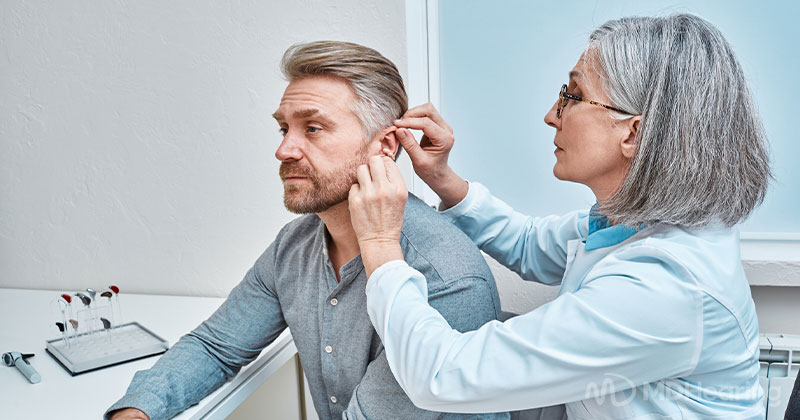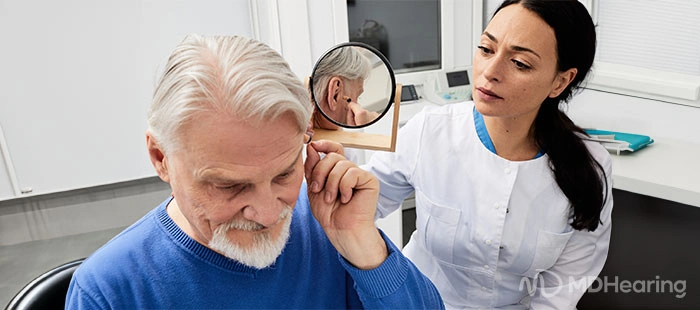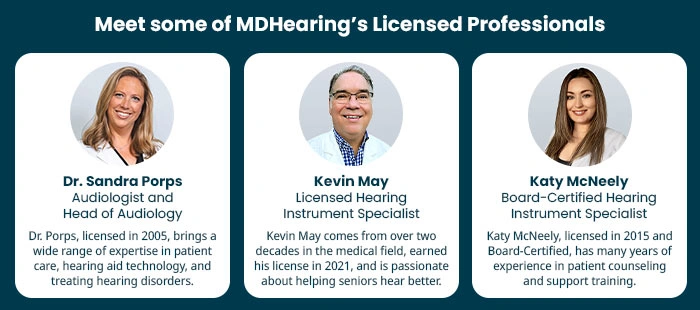Are you considering professional help for hearing loss? Curious about the role of Hearing Instrument Specialists (HIS)? With multiple types of hearing professionals out there, it's easy to feel overwhelmed.
This article will focus on Hearing Instrument Specialists—their qualifications, what they do, and where they work. We'll also clarify how these specialists differ from Audiologists. That way, you can make informed decisions about your care.
Let's start by taking a look at what Hearing Instrument Specialists are.
What Is a Hearing Instrument Specialist (HIS)?
A Hearing Instrument Specialist (HIS) is a licensed professional who has met all state requirements. Sometimes, they're called Hearing Aid Specialists or Hearing Aid Dispensers.
The International Hearing Society (IHS) defines these specialists as "qualified healthcare professionals that specialize in evaluating hearing health and providing solutions, including hearing aids, to address hearing loss." Like most hearing professionals, HIS often have varying credentials.
What Education and Training Are Required to Be an HIS?
The requirements to become licensed as a Hearing Instrument Specialist vary by state. Still, all HIS candidates must finish special training and education. They must also pass an exam before practicing. Several pathways—including certification programs, college degrees, and apprenticeships—meet the requirements. These can take six months to two years or more to complete.
Education Requirements
HIS candidates must meet these requirements to get a license to see patients and fit hearing aids:
-
High School Diploma or GED: All candidates must have a high school diploma or equivalent as a basic requirement.
-
Postsecondary Education (Optional): Some candidates pursue an associate degree or related courses in health sciences or audiology at a college or technical school.
Training Requirements
Hearing Instrument Specialist candidates often complete apprenticeships to acquire the skills needed to manage hearing health and pass the licensure exam. Apprenticeships can take six months to two years to complete. The time depends on state licensing rules.
Apprenticeships typically offer a combination of classroom, lab, and on-the-job training:
-
Classroom Learning: Coursework covers the anatomy and physiology of the ear and the auditory system. It also includes an understanding of the technology behind hearing aids and the needs of people with hearing loss.
-
Hands-on Lab Work: In these sessions, apprentices learn to conduct hearing tests. They also learn to make ear impressions and perform other lab tasks.
-
Clinical Experience: Apprentices work under the supervision of experienced and licensed hearing professionals. They learn how to fit hearing aids and care for patients with hearing loss.
State Licensing Requirements
Candidates must obtain a license to practice after finishing all state-specific training and education. Licensing can be accomplished by taking one or more exams.
-
Written Exam: Candidates must take and pass a written exam. For example, they may need to take the International Licensing Examination for Hearing Health Professionals (ILE).
-
Clinical Exam: Some states require candidates to pass a hands-on practical exam. It tests their ability to perform the duties of an HIS.
Hearing Instrument Specialists can also become board-certified on a national level rather than a state level. They can do this through the National Board for Certification in Hearing Sciences, which requires an exam. Nationally Board-Certified Hearing Instrument Specialists (NBC-HIS) have achieved the highest standards of knowledge and skills. They’re recognized as performing at an elevated level of competence.
-
National Certification Exam (NCE): This advanced written test assesses the practical knowledge and decision-making skills required to excel as a Hearing Instrument Specialist. Applicants must be licensed and have at least two years of experience or a diploma from specific programs.
Continuing Education (CE)
Even after becoming licensed and entering the workforce, education and training doesn’t stop there.
-
Ongoing Training: HIS must keep up with advances in hearing technology and hearing healthcare through CE courses.
What Does a HIS Do and Treat?
A licensed Hearing Instrument Specialist is crucial for supporting individuals with hearing challenges. Here are their core responsibilities:
Hearing Assessments and Device Fitting
-
Conduct tests to check auditory function
-
Choose and customize hearing aids to fit patient needs
-
Provide and adjust hearing aids for optimal performance
Maintenance and Customization
-
Create ear impressions and customize ear molds for a perfect fit
-
Perform routine upkeep and fix damaged hearing aids
Counseling and Support
-
Offer guidance and information on managing hearing loss
-
Assist with using hearing aids and other assistive devices
-
Provide ongoing care to ensure continued effectiveness and comfort of hearing solutions
-
Clean earwax that may impair hearing, where authorized
As you can see, Hearing Instrument Specialists focus on technical and supportive aspects of hearing care. They can't diagnose or treat hearing loss, tinnitus, and other disorders. They can only test for hearing loss, evaluate fit, and maintain hearing aids.
Where Does a HIS work?
Hearing Instrument Specialists work in settings that cater to different aspects of hearing care. According to the U.S. Bureau of Labor Statistics, most work in the health and personal care retail industry.
Manufacturers, Retailers, and Wholesalers
-
Retail Chains: HIS work in small and large chains that sell and dispense hearing aids, such as Costco or Sam’s Club.
-
Technical Support: As technicians, they provide support for hearing instruments in these types of organizations.
-
Sales Management: HIS often advance to oversee the sales of hearing aids and related tech.
Medical Settings
-
Physician Offices, Hearing Clinics, and Hospitals: HIS assist by conducting tests and fitting hearing aids.
-
Government Health Facilities: Federal, state, and local governments employ HIS for hearing care.
Academic and Research Institutions
-
Colleges, Universities, and Professional Schools: HIS may be involved in the research, development, and marketing of new hearing technologies.
-
Educational Support: HIS might also work in academic settings, providing support and training in hearing health technologies.
Entrepreneurial Ventures
-
Private Clinics: Licensed HIS often open their own clinics where they test and dispense hearing aids.
Telehealth Settings
-
Remote Retailers: Licensed HIS can also conduct telehealth hearing care via phone, email, text, and video chat.
What's the Difference Between Audiologists and HIS?
Audiologists and Hearing Instrument Specialists both fit hearing aids to address hearing loss. However, the two hearing professionals differ in their credentials and services they can offer.
Range of Functions
HIS are limited to functions directly related to fitting hearing aids. In contrast, Audiologists diagnose, manage, and treat patients with hearing loss. They also treat tinnitus (ringing of the ear), balance disorders, and other conditions. Both counsel patients to help them deal with their hearing; however, only Audiologists can provide an aural rehab program.
Level of Expertise
Hearing Instrument Specialists complete certification programs and apprenticeships, often with a college certificate. Audiologists must have an undergraduate degree in a related discipline and a graduate degree in audiology. It can be a master's or doctorate, depending on state rules and when a person received their license. Audiologists aren't physicians but can hold a professional degree as a Doctor of Audiology (Au.D.). It usually takes four years to complete a doctorate following a bachelor's degree.
Licenses and Certifications
Like HIS, audiology candidates must complete hands-on clinical training, gain on-the-job experience, and pass an audiology exam to become licensed. Once licensed, a HIS and Audiologist can work where hearing aids are dispensed. An Audiologist may also work with ENT (ear, nose, and throat) physicians and surgeons and treat patients who may benefit from cochlear implants.
When Should I See an Audiologist vs. a Hearing Instrument Specialist?
A Hearing Instrument Specialist can test hearing and sell hearing aids. An Audiologist can address medical issues and make custom health plans.
If you have concerns with any of the following, it’s best to see an Audiologist:
-
Tinnitus (ringing in your ears)
-
Dizziness or feeling off balance
-
Exploring implant options like a bone-anchored implant or a cochlear implant
If you think you have hearing loss, either an Audiologist or a Hearing Instrument Specialist can help by:
-
Testing your hearing
-
Determining if you’re a candidate for hearing aids
-
Discussing potential hearing aid options
Nowadays, thanks to technology, HIS and Audiologists can work remotely. Both types of professionals can help patients via mobile phone, computer, or another internet-enabled device. That means you no longer need to fight traffic or sit in an office waiting to be seen.
Does MDHearing Have Hearing Instrument Specialists and Audiologists on Staff?
Yes! At MDHearing, we take pride in having an entire in-house team of both licensed Audiologists and Hearing Instrument Specialists—all based in the U.S. and ready to assist you. With decades of experience in the hearing industry, our hearing professionals provide clinic-level care from the comfort of your home, including consultations, personalized recommendations, device fitting, adjustments, and troubleshooting.
Everything we do—from designing our products to providing the best care and customer support—benefits from the expert knowledge of our team. Check out our About Us page to learn more.
Conclusion
Hearing loss is common, especially as you age. Understanding the role that Hearing Instrument Specialists and Audiologists play in evaluating hearing health and providing solutions (such as hearing aids) will help you choose the best path of treatment.
Take comfort in knowing that MDHearing is a top brand of hearing aids backed by a full team of licensed HIS and Audiologists who offer clinic-level support. Our affordable line of high-quality, FDA-registered OTC hearing aids also comes with a 45-day trial, so you can make sure they’re the right fit for you, risk-free
Get started with MDHearing’s free online hearing test and free telehealth consultation with a licensed professional.
TAKE ONLINE HEARING TEST


